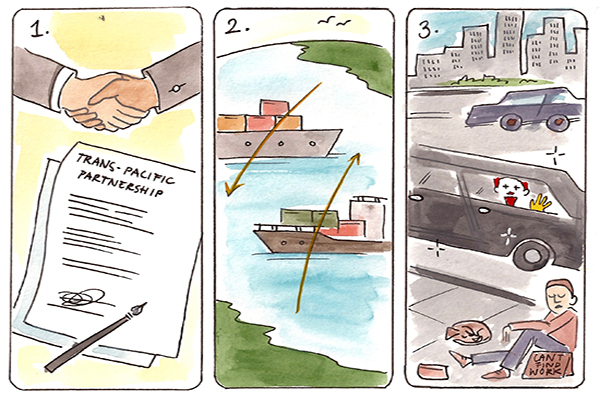When Oxfam’s 2016 Davos Report revealed that 62 people own half of the global wealth many were shocked by this finding and attributed it to high poverty levels in low-income countries. However, wealth inequality is also a problem in rich countries like the US. The OECD found that the wealthiest 10% of US households own 76% of the total wealth, while those at the bottom 40% of the distribution have no wealth at all. To make matters worse, the 2008 Great Recession wiped out the wealth of many American families, and they failed to regain it in the ensuing recovery. Research done by Levy Institute’s Pavlina Tcherneva found that in the aftermath of the Great Recession, real incomes of those in the bottom 90% of the US income distribution have fallen, while those in the top 10% have enjoyed all the gains of the recovery.
These trends are the result of neoliberal “free-market” policies implemented since the 80s, which emphasized tax cuts, deregulation, and weakening of labor protections, all under the guise of increasing efficiency. Trade deals, while not the sole culprit, have played an important part in the downward pressure on wages for American workers and the loss of numerous domestic manufacturing jobs. The rise in global trade has created severe competition for many American workers, many of whom have lost their jobs or been forced to accept pay cuts. Trade agreements put in place by the US offer corporations the necessary legal protections to safely relocate their business overseas. While proponents of trade agreements continue to insist these will create new jobs for American workers, the opposite has been true. For example, the Economic Policy Institute estimates that almost 700,000 jobs have been lost as result of the North American Free Trade Agreement (NAFTA), despite it promising to create 200,000 new jobs for American workers.
The Trans-Pacific Partnership (TPP), an agreement between 12 countries, which together make up for 40% of world trade, is considered by Obama a key element of his legacy and follows a “pro-market” approach similar to most policies of the neoliberal era. This pact will eliminate tariffs, and impose and enforce stronger patent protections overseas while also reducing restrictions for tech companies to enter foreign markets. Obama’s administration promises the deal will “level the playing field for American workers & American businesses,” and “strengthen the American middle class.” However, a closer reading of the provisions of the agreement offers a different interpretation. The TPP will strengthen the power of multinational corporations, expand their influence over governments, and increase profit margins at the expense of American workers.
Amongst the most concerning provisions of the TPP is one that gives corporations an easy path towards suing governments and thus undermining their sovereignty. The treaty agrees to establish an Investor-State Dispute Settlement (ISDS), through which corporations can challenge domestic laws in countries that are part of the TPP. These challenges would be resolved through arbitration, rather than traditional courts. The arbitration process is led by panels composed of three corporate lawyers, only one of whom is government appointed. As Elizabeth Warren warned in this Op-Ed, the provision “would allow big multinationals to weaken labor and environmental rules.”
Those arguing in favor of the TPP claim it will allow the US to write the rules on how trade with Asia should be conducted. Yet this argument fails to mention that it’s American corporate interests that will write the rules. Free trade with the countries participating in the TPP is already established, and this agreement does not open up new opportunities for trade; rather it sets the terms in favor of business interests. The TPP will further erode bargaining power of American workers, who will face increased legal scrutiny over protections they enjoy. By solidifying the legal power corporations enjoy abroad, the agreement will facilitate smooth relocation and outsourcing of more and more jobs. This additional threat to job security for American workers will increase downward pressure on their wages, while the profits of corporations will grow, thus upholding the trend of rising income inequality. It is not a coincidence that as the global influence of corporations increases, so does disparity of wealth.
The positive impacts the TPP might have on the economy would be absorbed by the wealthy, while average American workers would suffer the negative consequences. The TPP protects large multinational corporations; yet offer few safeguards for lower-skilled domestic workers. Overall, it is reasonable to argue that the TPP would only further exacerbate income inequality by tilting the balance even further in favor of big companies. However, it is also unrealistic to argue that by rejecting the TPP and other trade agreements the US can bring back all the manufacturing jobs it lost.
American policymakers need to realize that it is vital to draft agreements that take into account the needs of working people, and not just of corporations; that there is an active need for policies that can once again strengthen the American middle class. Otherwise, the discontent of workers who continue to see their incomes decline and job prospects worsen will allow fringe candidates such as Donald Trump, who foster racist and xenophobic rhetoric, to rise to power. Although the solutions offered by Trump make little economic sense, he gains in popularity by recognizing that American workers have been disadvantaged by various trade deals.
It is urgent for policymakers to stop pushing for policies that expand income inequality, and to look for strategies to reverse this trend. In the late 1970s full employment was abandoned as a policy goal, labor protections were eroded, finance deregulated, and taxes for the wealthy reduced. Seeing the consequences of these changes in the falling living standards of most Americans and exploding income inequality, it is time to take action and work to rolling back these policies. Pushing for more agreements amongst those same lines, such as the TPP, will only make matters worse.
By Lara Merling
Illustration by Heske van Doornen
